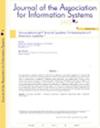智能计量技术采用的有效性:来自英国全国推广的证据
IF 5.5
3区 管理学
Q1 COMPUTER SCIENCE, INFORMATION SYSTEMS
引用次数: 2
摘要
为了应对气候变化对人类日益增长的威胁,许多政府,如美国和大多数欧洲国家,已经启动了智能计量技术(SMT)的推广计划。尽管最近的投资引人注目,SMT的采用是否以及为什么有助于减少家庭能源需求的问题仍然相对未被探索。在认知失调理论的基础上,提出了SMT采用、住宅节能行为及其调节因素的研究模型。然后,我们使用2012年至2016年英国丰富的家庭数据集对该模型进行了实证检验。我们的研究结果表明,SMT的采用与节能行为呈正相关,而节能动机在很大程度上缓和了这种联系——对节能的低水平关注/对气候变化的高水平关注放大了这种影响。重要的是,我们发现SMT使用正向调节这种关系,但这种边际收益在技术使用强度中下降。我们的研究结果通过展示新技术采用的后果以及认知失调在促进预期目标和识别潜在调节效应方面的作用,为信息系统文献做出了贡献。我们为政策制定者和公用事业公司讨论了可操作的见解。本文章由计算机程序翻译,如有差异,请以英文原文为准。
On the Effectiveness of Smart Metering Technology Adoption: Evidence from the National Rollout in the United Kingdom
In response to the burgeoning threats of climate change to humanity, numerous governments, such as those of the United States and most European countries, have launched rollout programs for the distribution of smart metering technology (SMT). Despite this notable recent investment, questions of whether and why SMT adoption facilitates the reduction of households’ energy demands remain relatively unexplored. Building on cognitive dissonance theory, we propose a research model for SMT adoption, residential energy-saving behaviors, and moderating factors. We then empirically test the model using a rich household dataset from the United Kingdom between 2012 and 2016. Our results show that SMT adoption is positively associated with energy-saving behaviors, while energysaving motivations substantially moderate this association—a lower level of concern about saving energy / a higher level of concern about climate change amplifies this effect. Importantly, we find that SMT usage positively moderates this relationship, but this marginal gain decreases in technology usage intensity. Our findings contribute to the information systems literature by showing a consequence of new technology adoption along with the role of cognitive dissonance in promoting intended objectives and identifying potential moderating effects. We discuss actionable insights for policymakers and utility firms.
求助全文
通过发布文献求助,成功后即可免费获取论文全文。
去求助
来源期刊

Journal of the Association for Information Systems
工程技术-计算机:信息系统
CiteScore
11.20
自引率
5.20%
发文量
33
审稿时长
>12 weeks
期刊介绍:
The Journal of the Association for Information Systems (JAIS), the flagship journal of the Association for Information Systems, publishes the highest quality scholarship in the field of information systems. It is inclusive in topics, level and unit of analysis, theory, method and philosophical and research approach, reflecting all aspects of Information Systems globally. The Journal promotes innovative, interesting and rigorously developed conceptual and empirical contributions and encourages theory based multi- or inter-disciplinary research.
 求助内容:
求助内容: 应助结果提醒方式:
应助结果提醒方式:


